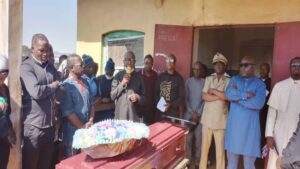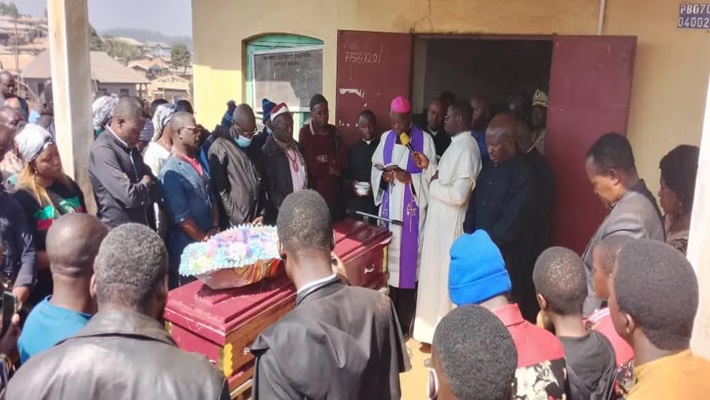By Paschal Norbert
NKAMBE, FEBRUARY 16, 2024 (CISA) – As the people in the Catholic Diocese of Nkuo, Cameroon, come to terms with the tragic happenings of last Sunday, February 11, Bishop George Nkuo has condemned the tragedy, which claimed one life in Nkambe and another which led to the disruption of the celebration of Mass in Jakiri in the northwest region of the country.
“We cannot remain silent about the recent happenings in our diocese on Sunday, the 11th of February 2024. Prior to that day, the population had suffered the pain of not being able to go about their activities because of the several days of ghost town/ lockdown that had been imposed on them bringing their economic activities to a standstill,” the bishop decried in a statement dated February 14.
On February 11 in two separate incidents, an improvised explosive device was detonated around the ceremonial grounds in Nkambe where many young people had gathered for the celebration of the Cameroon National Youth Day. The explosion wounded about 82 students, left several others in critical condition and claimed the life of one form four student, Cherish Lemyuy. In Jakiri, a group of armed men, suspected to be Ambazonian fighters, stormed Christ the King Parish Church, disrupted the Holy Mass and bullied the faithful out of the Church as the service was going on.
The 15-year-old was buried on February 13, in a somber ceremony that brought together religious leaders, politicians, and well-wishers, highlighting the persistent conflict in Cameroon’s Anglophone regions.

In commiserating with the family of Lemyuy, Bishop Nkuo said “We should remember that children represent the most vulnerable and precious members of our society, and any harm inflicted upon them is an affront to our shared humanity. This act of violence shatters the very core of our moral fabric and calls for our collective condemnation. We condemn in the strongest terms this heinous and senseless attack on innocent civilians during the Youth Day celebration in Nkambe. Every human life is precious and sacred, and such acts of violence inflict immeasurable pain and suffering on individuals, families, and communities.”
“We must stand united against this brutality and affirm our commitment to peace, justice, and compassion. We must stand together in denouncing such atrocities and demand that every child be granted the right to live in safety, peace, and dignity,” he added.
The prelate denounced the cowardly act of the armed group and warned against the desecration of places of worship. He said even in war, places of worship and other religious sites should be sanctuaries where worshippers feel safe to practice their faith, sanctuaries of peace, healing, and solace for all individuals seeking comfort and divine intervention.
“Such acts, like the one at Christ the King Parish Jakiri, not only violate the sanctity of these institutions but also undermine the values of compassion, empathy, and respect that lie at the core of our faith. The Mass is a sacred and solemn occasion where the faithful gather to worship, seek spiritual nourishment, and strengthen their relationship with God. Such disruptions not only disrespect the sanctity of the Mass but also infringe upon the rights and freedom of religious expression. The house of God should be a haven of peace, where all can come together in reverence and unity,” he stated.
“We strongly condemn and denounce any form of violence perpetrated during public and spiritual gatherings and within the sacred spaces of Churches and Hospitals. We implore the armed groups involved in perpetrating these acts to reflect upon their actions and give the population the much-desired freedom to go about their spiritual and other activities unhindered,” he maintained.
Bishop Nkuo appealed to all warring parties to seek the path of peace through sincere dialogue to end the crisis in Cameroon, which he said was ‘long overdue’.
According to a report by the Global Centre for the Responsibility to Protect, “More than 6,000 people in Cameroon have been killed as a result of violence in the north-west and south-west regions since 2016, when English-speaking lawyers, students and teachers in Cameroon began protesting their cultural marginalization by the Francophone-dominated government, leading to a violent crackdown by security forces.”
Since the Anglophone Crisis started, civilians in the Anglophone regions have been the unfortunate victims of the widespread violence between government forces and armed separatists, with the armed extremist groups also posing an ongoing threat in the far North regions.
